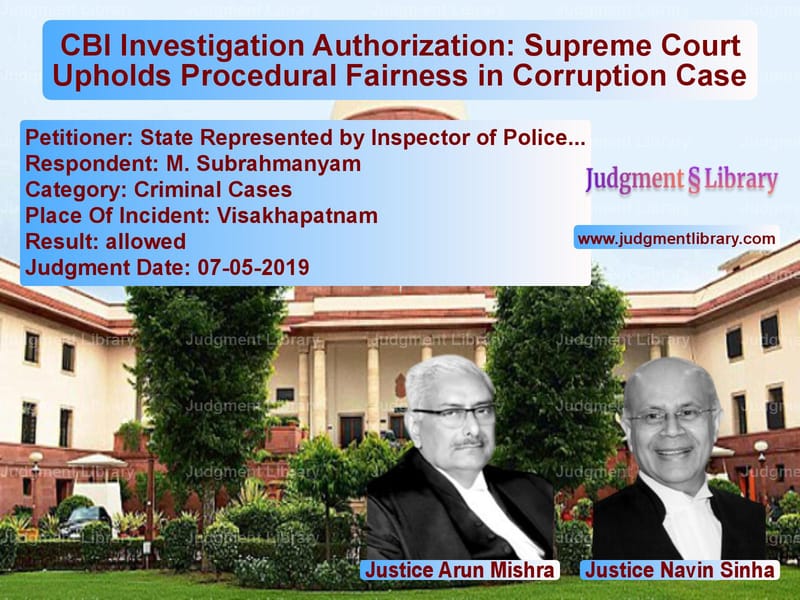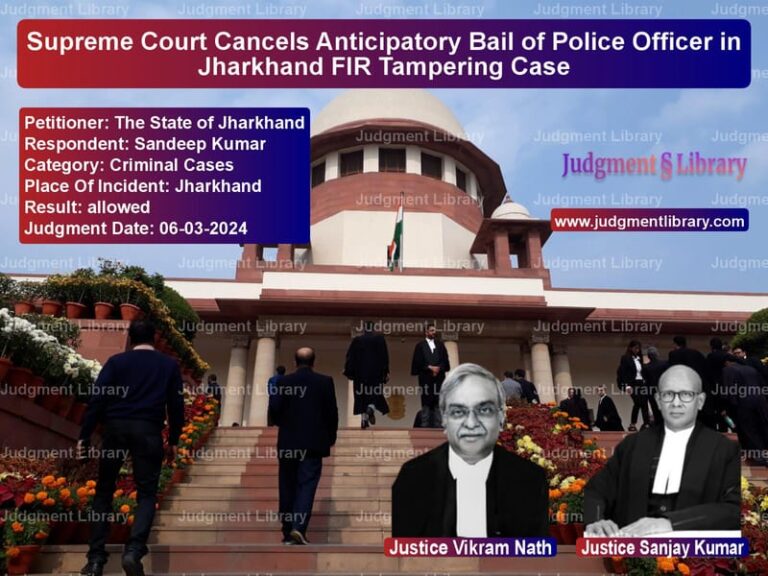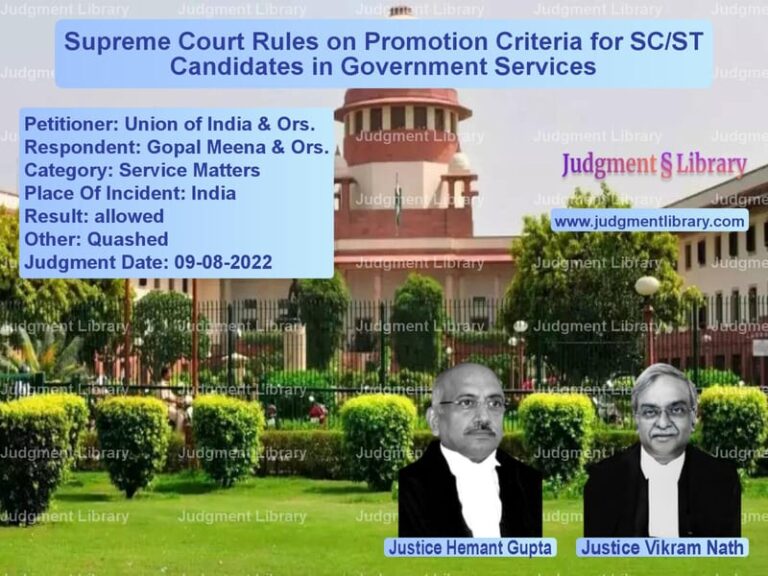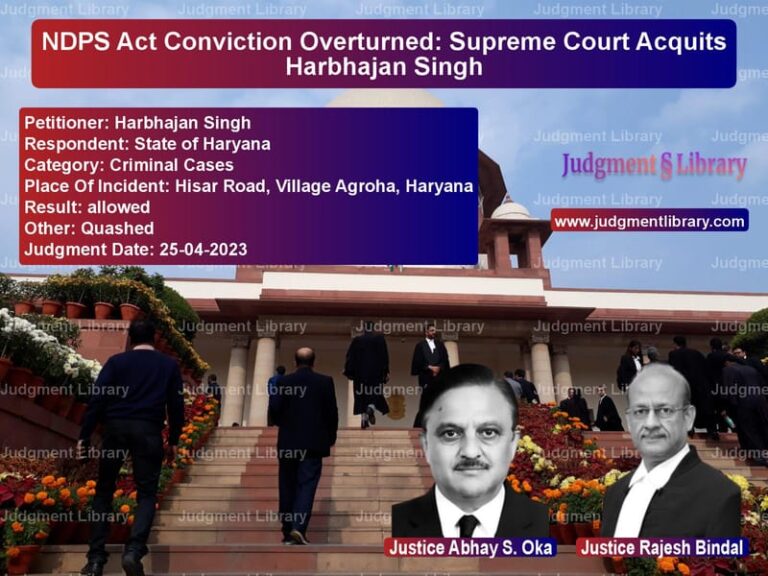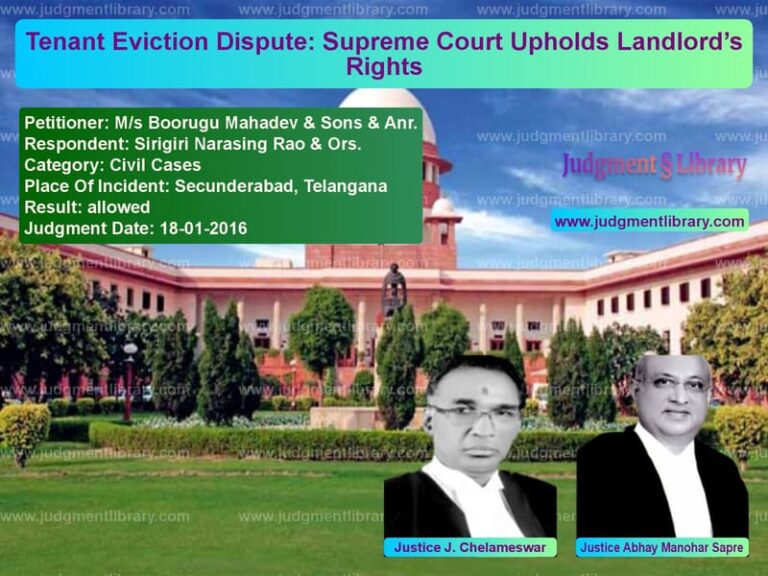CBI Investigation Authorization: Supreme Court Upholds Procedural Fairness in Corruption Case
The case of State Represented by Inspector of Police, CBI vs. M. Subrahmanyam revolves around the procedural aspects of investigating corruption cases under the Prevention of Corruption Act, 1988. The Supreme Court ruled on whether the prosecution could bring on record the order of authorization for investigation after the charge sheet had been filed. This case highlights the balance between procedural rules and the pursuit of justice in cases of alleged corruption by public servants.
The Central Bureau of Investigation (CBI) sought to bring on record an authorization order under Section 17 of the Prevention of Corruption Act, 1988, which permitted an officer to investigate an Income Tax Officer accused of possessing assets disproportionate to his known sources of income. The High Court had dismissed the prosecution’s application, leading to an appeal before the Supreme Court.
Background of the Case
The respondent, M. Subrahmanyam, was an Income Tax Officer in Visakhapatnam. An FIR was registered against him on November 1, 2002, under Sections 13(2) read with 13(1)(c) of the Prevention of Corruption Act. The allegations concerned his possession of movable and immovable properties beyond his known sources of income.
The charge sheet was filed on April 5, 2005. However, due to inadvertence, the authorization order permitting the investigation was not included in the charge sheet. The prosecution sought to rectify this procedural lapse by filing an application under Section 242 of the Criminal Procedure Code (CrPC) in 2008, but the application was dismissed on the grounds that no satisfactory explanation was given for the delay. A second application under Section 173(2)(5)(a) CrPC was filed in 2013 but was dismissed by the trial court and later by the High Court.
Petitioner’s Arguments
The prosecution, represented by the Inspector of Police, CBI, argued:
- The omission to file the authorization order was a procedural lapse, not a substantive error.
- The earlier rejection of the application was not based on the merits of the case but on a technical ground related to procedural delay.
- The failure to include the authorization order at the time of filing the charge sheet should not prevent its submission later.
- The interest of justice required that the order be allowed on record, as its veracity was not in dispute.
- Section 362 CrPC was incorrectly applied by the lower courts, as there had been no final adjudication on the merits.
Respondent’s Arguments
The respondent, represented by his legal counsel, countered:
- The application was rightly dismissed, as the prosecution had failed to explain the delay in submitting the authorization order.
- Once an application was rejected, the prosecution should have pursued an appeal or revision instead of filing a fresh application under a different provision.
- Allowing the prosecution to rectify its procedural lapse at this stage would cause serious prejudice to the accused.
- The rejection of the application had attained finality, and the prosecution should not be permitted to reopen the matter.
Supreme Court’s Analysis
The Supreme Court carefully examined the procedural aspects of the case and the implications of allowing or rejecting the application. The key legal observations were:
- The failure to include the authorization order in the charge sheet was a procedural omission, not a substantive defect.
- The rejection of the earlier application was based on the failure to explain the delay, not on the merits of the authorization order.
- Section 362 CrPC, which prevents alteration of judgments, did not apply here as there was no final adjudication on the matter.
- The principle of res judicata (finality of judicial decisions) was wrongly applied by the lower courts, as the first rejection was procedural, not substantive.
- Justice should not be obstructed by a procedural lapse, particularly in corruption cases involving public servants.
Key Judicial Findings
The Supreme Court ruled:
- The prosecution was allowed to bring the authorization order on record.
- The interest of justice required that procedural lapses not obstruct the trial of corruption cases.
- The failure to file the authorization order earlier did not justify barring its submission later.
- The High Court had adopted an overly technical approach instead of considering the broader interests of justice.
- The trial court should proceed with the case, considering the authorization order as part of the record.
Conclusion and Impact
This ruling emphasizes the importance of balancing procedural compliance with the need to ensure that justice is served. The Supreme Court reinforced that procedural rules should not become a means of obstructing trials, particularly in corruption cases where public trust is at stake.
The decision sets a precedent that courts should prioritize substantive justice over procedural technicalities, especially when dealing with cases of public corruption. By allowing the authorization order to be brought on record, the Supreme Court ensured that the trial could proceed fairly and that the prosecution was not penalized for a procedural oversight.
Petitioner Name: State Represented by Inspector of Police, CBI.Respondent Name: M. Subrahmanyam.Judgment By: Justice Arun Mishra, Justice Navin Sinha.Place Of Incident: Visakhapatnam.Judgment Date: 07-05-2019.
Don’t miss out on the full details! Download the complete judgment in PDF format below and gain valuable insights instantly!
Download Judgment: State Represented by vs M. Subrahmanyam Supreme Court of India Judgment Dated 07-05-2019.pdf
Direct Downlaod Judgment: Direct downlaod this Judgment
See all petitions in Fraud and Forgery
See all petitions in Money Laundering Cases
See all petitions in Judgment by Arun Mishra
See all petitions in Judgment by Navin Sinha
See all petitions in allowed
See all petitions in supreme court of India judgments May 2019
See all petitions in 2019 judgments
See all posts in Criminal Cases Category
See all allowed petitions in Criminal Cases Category
See all Dismissed petitions in Criminal Cases Category
See all partially allowed petitions in Criminal Cases Category

